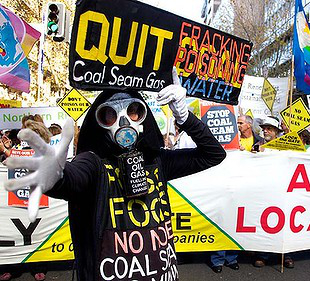Resource body takes new look at old activist tactics
 The Queensland Resource Council has released its updated ‘checklist’ for anti-mining activism in the state, saying opponents are mostly up to their old tricks.
The Queensland Resource Council has released its updated ‘checklist’ for anti-mining activism in the state, saying opponents are mostly up to their old tricks.
Queensland Resources Council Chief Executive Michael Roche says there is a concerted effort from a number of groups to frustrate, delay and distract mining companies trying to access assets all over Queensland.
The QRC says moves underway in the Queensland government, which will stop parties without direct interest in mining projects from being able to complain in court, are a good step.
But ongoing protests continue to risk safety and productivity, Mr Roche said.
“Two years after the strategy document Stopping the Australian Coal Export Boom was leaked to the media, it is valuable to see how the anti-coal (and coal-seam gas) campaign has unfolded in Queensland,” Roche said.
“The signatories to the strategy document have all contributed to campaigns high on slogans but void of science to support claims that shipping and port dredging are major threats to the environmental health of the Great Barrier Reef.
“Tactics for the so-called ‘Battle of the Galilee’ include organising landowners to help delay the development of mines and railways while noting the location of coal ports adjacent to the Great Barrier Reef Marine Park is seen as an opportunity for ‘alliance building’ with scientists and industries including fishing and tourism.
“The strategy of mounting legal challenges to disrupt or delay new projects is well recorded with appeals in the Queensland Land Court over the Alpha coal mine project in central Queensland from a Canberra resident and an interest group with a postal address in Brisbane’s West End,” he said.
Mr Roche says that while the World Wildlife Fund for Nature (WWF) and the Australian Marine Conservation Society (AMCS) are not overtly anti-mining, they are at least walking both sides of the street.
“For example, on key environmental issues such as Great Barrier Reef water quality, WWF had played a constructive role in promoting the importance of land management practices to reduce nutrient and sediment loads entering the lagoon.
“Last year, WWF and AMCS were brought together by the Thomas Foundation – which previously had a proud record of funding science based conservation activities.
“The outcome is a marine ‘advocacy program’ - the so-called ‘Fight for the Reef’ campaign - whose website and other collateral is littered with untruths.
“It is disappointing to see WWF in particular becoming more Greenpeace-like by the day,” Mr Roche said.







 Print
Print